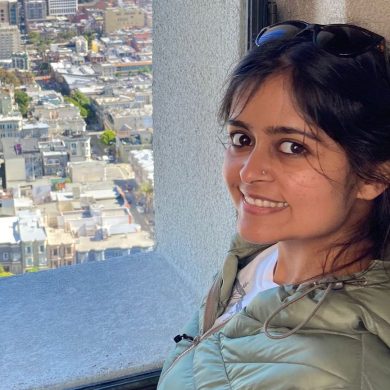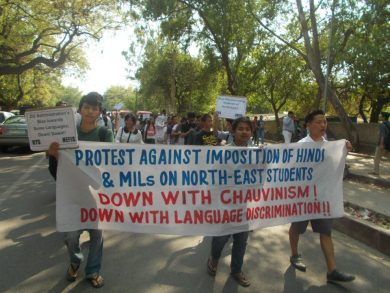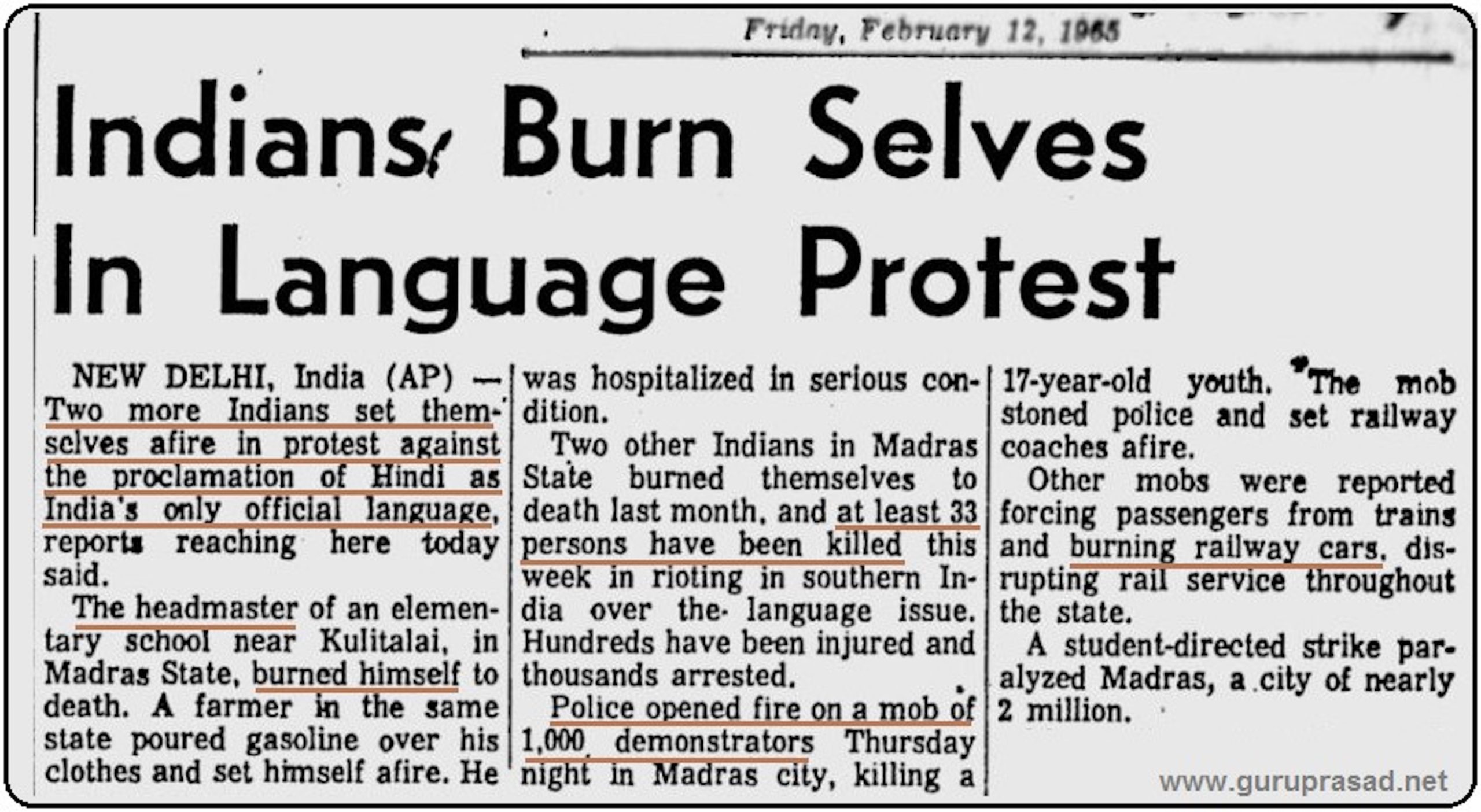Grad Profile: Radhika Prasad
 Radhika Prasad is a PhD student in Literature at UC Santa Cruz. Prasad’s research concerns post-independence Hindi literature and the relationship between literature, language politics, and nation-building. In February, we learned more about Prasad’s ongoing research, her year-long Public Fellowship with the Center for the Art of Translation, and her experiences as a mentor in the Graduate Student Success Program. We discussed the ways literary production can work to destabilize linguistic borders, the importance of building contacts with translators working on South Asian languages, and the role of peer mentorship in graduate student success.
Radhika Prasad is a PhD student in Literature at UC Santa Cruz. Prasad’s research concerns post-independence Hindi literature and the relationship between literature, language politics, and nation-building. In February, we learned more about Prasad’s ongoing research, her year-long Public Fellowship with the Center for the Art of Translation, and her experiences as a mentor in the Graduate Student Success Program. We discussed the ways literary production can work to destabilize linguistic borders, the importance of building contacts with translators working on South Asian languages, and the role of peer mentorship in graduate student success.
Hi Radhika! Thanks for chatting with us about your public fellowship work and your ongoing research and writing. To begin, could you give us a general synopsis of your dissertation project?

Hi Kirstin! Of course. My dissertation examines the modernist Hindi novel of the post-independence period in India, encompassing the decades of the 1950s, 60s, and 70s, in the context of nationalism and national language politics. In the context of the extremely diverse linguistic landscape of India, Hindi operates as a hegemonic language. In the midst of intense protests, it was adopted as the official language of India in 1949. Recently, with the rise of right-wing nationalism, it has been appropriated as the language of the Hindu right, with the Government of India taking gradual steps towards imposing Hindi as the national language, despite vast sections of the population identifying with other languages as their “mother tongue”. As an attempt to understand the drawing of linguistic borders as part of the construction of a national narrative, my dissertation turns to post-independence Hindi literature that used modernism as a rubric to expand language. The literary archive that I look at uses the “official language” of the nation to write alternative stories to the one about the nation.
Your dissertation traces the emergence of experimentalism/‘Modernism’ in Hindi writing, and the ways this movement precipitated a sort of crisis of postcolonial subjectivity. I’m wondering if you can talk a little bit more about the relationship between literary production and nation-building particularly as a decolonial project.

The legacy of nationalism is one that includes colonialism. The form of the democratic nation comes to us via the European Enlightenment, and so colonialism and imperialism–the drawing of borders, claiming homogeneity within those borders and heterogeneity outside of them–are inherent to that form. I think the present historical moment is under pressure to radically redefine nationhood in decolonial terms–and this involves the destabilization of geographical and linguistic borders among others. I think literary production often writes alternative histories of the nation to the hegemonic history of borders, and thus facilitates this destabilization of borders to allow the reimagining nation-building as a decolonial process. This is partly what I’m exploring in my archive–how literary production destabilizes linguistic borders and reimagines the nation as a cosmopolitan, transnational, translational, and feminist possibility.
How is translation both a scholarly act and also a material lived experience? Why is it important for you to account for and attune to both these translation frameworks? What sort of bridges do you hope your work (both intellectual and community-based) can build?
I felt compelled to actively shape the American academy by my outsider’s perspective, instead of being passively shaped by it.
As an international student working on a marginal literature, I find that translation suffuses both my academic work and lived experience. When I think about it, after coming to the US, the more I experienced my day-to-day living as translated, my thoughts and words shaped by what will or will not be legible to the people around me, the more I was drawn to studying literature in my own language–both because it continued to nourish my relationship to my roots, and because I felt compelled to actively shape the American academy by my outsider’s perspective, instead of being passively shaped by it. I’m glad that you use the metaphor of the bridge. I think translation as a framework has the potential to work against what Gayatri Spivak has called the “one-way traffic” of globalization, wherein cultural exports cause the third world to develop familiarity with the first world’s supermarkets, cafes, street signs, and so on, but there is little reciprocal understanding of the third world beyond what comes in the form of consumer goods.
This year, you are working as the Year Long Public Fellow with the Center for the Art of Translation. Can you share what drew you to this position and what you spend the majority of your time working on?
The Center’s deep commitment to translation struck a note with me as an international student–in its publishing as well as its workshops and other events, it was in effect centering the voices of outsiders like myself.
The point about “bridges” is a good place to talk about my public fellowship. The Center for the Art of Translation, and their literary imprint, Two Lines Press, are doing crucial work in using translation as a bridge. My work with the Center allows me to make a rich archive of writing in non-metropolitan languages available to a metropolitan/American readership, and conversely make opportunities for a wider readership and exposure available to translators and writers in other parts of the world. While I have been interested in exploring publishing as a career for a while, what drew me to the Two Lines Press was the fact that they mainly publish translations from underfunded languages in the US. Another significant chapter of the Center is their Poetry Inside Out program, which works closely with educators to bring translation workshops to classrooms of different grades. The Center’s deep commitment to translation struck a note with me as an international student–in its publishing as well as its workshops and other events, it was in effect centering the voices of outsiders like myself.
I was drawn to this position both because of this resonance in terms of marginality, but also because it gave me an opportunity to connect with my own intellectual communities back home, in India. My work with the Center currently involves building contacts with translators working on South Asian languages. The work involves more research and open-ended conversations than I had expected. In conversations with my mentors and in my own experience I have learned that the often efficient US American time must bend and warp to adjust to how time works in other climates! It must also adjust to the time of translators, who are forced to couple their practices of translation with other, more demanding jobs, since the labor of translation remains underrecognized and underpaid. Perhaps for these reasons, the Center’s commitment of their resources to translation and the building of translatorial and publishing communities, is commendable.
You are currently serving your second year as a Peer Mentor in the Graduate Student Success Program. Why is it important for graduate students in the humanities to have institutionalized structures of mentorship and community support? What is your personal pedagogy of peer mentorship?
My personal pedagogy of mentorship for graduate students takes into account the fact that they are, especially in their first two years, frequently struggling with schedules that are demanding more of them than they can possibly give. With that in mind, I make myself available to my mentees, while making sure that they have the space to approach me in a moment of calm, and when I can be most useful to them. While structured meetings can be useful to some mentees, for others it can be an added source of anxiety, and so I follow their lead in how often to meet. Often it is helpful to schedule a quick phone call to check in, and offer them some practical suggestions based on whatever they are working on at the time. This could be writing, teaching, grading, presenting a conference paper, or any other activity pertaining to school.
The knowledge that can be gained from developing a one-on-one relationship with a mentor is irreplaceable.
My involvement in the Graduate Student Success Program over the past two years, as well as the Graduate Student Commons’ Peer Mentorship program, has brought me to the understanding that mentorship is perhaps the missing ingredient in graduate school, whose presence can lead to greater equity and access for scholars from marginalized backgrounds. All too often as I have navigated grad school, I have experienced that not only do I lack answers, I also don’t know the questions that I should be asking. In other words, I was not familiar with the “hidden curriculum.” While programming around topics that are relevant to grad students, that touches upon both academic training as well as occupying institutional spaces is incredibly helpful, I think that the knowledge that can be gained from developing a one-on-one relationship with a mentor is irreplaceable.
Banner Image courtesy of Two Lines Press
